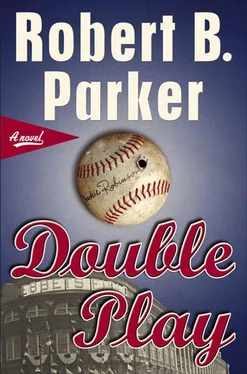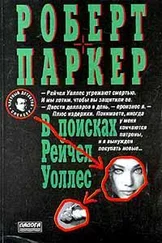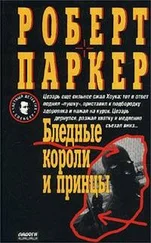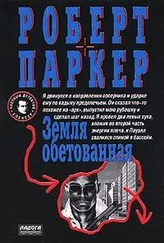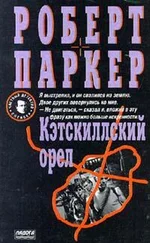Robert B. Parker
Double Play
For Joan, who has,
as I suspect of Rachel Robinson,
made all the difference
This is a work of fiction about a real man. Most of what I’ve written I made up. I have, however, attempted to render Jackie Robinson accurately. As he was, or as I imagined him to be, in 1947, when I was turning fifteen, and he was changing the world. The rest is altogether fiction. It may be more Burke’s story than Jackie’s. But without Jackie, Burke would have had no story. And neither would I.
— Robert B. Parker
Cambridge, Massachusetts
June 2003
Joseph Burke got it on Guadalcanal, at Bloody Ridge, five .25 caliber slugs from a Jap light machine gun, stitched across him in a neatly punctuated line. The medics put on pressure bandages and shot him up with morphine and nothing much made any sense to him afterward. It was a blur of tubes and nurses and bright lights and descents into darkness, surgeons, frightening visions, and bad smells and the feel of ocean. One day he looked around and he was in bed in a hospital.
“Where the fuck am I?” he asked a nurse.
“Chelsea Naval Hospital.”
“Am I going to live,” he said.
She was a fat gray-haired woman with deep circles under her eyes. She nodded.
“Yes,” she said.
For weeks he was paranoid delusional. He heard the nurses whispering together at night. They had husbands in the army; they hated Marines. He could hear their husbands whispering with them, visiting them on the floor, parking their cars with the motors running just outside his window. The ceiling lights were recessed. He saw small figures in them, a man being greeted by a butler in an ornate hallway. He slept only in moments, watching the clock on the ward wall. 0300 hours. Dawn will be here in 180 minutes. He could see the tip of a steeple through the window on the opposite wall. Sometimes he thought it was the bridge of a troop ship. Sometimes he thought it was the church he used to go to in South Boston. Sometimes it was a church steeple outside his hospital window. His wife came to visit. He asked her if she would bring him a gun, it would make him feel safer. If he had a gun he wouldn’t feel so scared. One day they disconnected him from his tubes and one of the nurses got him up and helped him walk the length of the ward. He had to sit for a while in a straight chair at the other end, before he made the return trip. The next time they took him for a short walk into the corridor, past the nurses’ station to the visitors’ lounge. He walked stoop-shouldered, shuffling his feet. He sat in the lounge for a while with a small red-haired nurse with freckles. Then he shuffled back. At night he woke up and heard the nurses plotting with their boyfriends, the engines of their parked cars murmuring outside his window. He mentioned it the next morning to a nurse.
“Cars with their motors running?” the nurse said.
“Yeah. I keep listening to them. I keep hoping that they’ll leave, but they don’t.”
“Right outside the window?”
“Yeah.”
“You’re on the ninth floor.”
He heard her but the words meant nothing.
“Too many drugs,” the nurse said. “Too long in the intensive care unit. It’s making you crazy.”
He knew she was right. He knew he was crazy, but oddly, knowing it didn’t make him less crazy. Sometimes he knew both realities at the same time. He knew he was in a ward at the Chelsea Naval Hospital. He also knew he was being stalked in a stark diner in New Bedford on a bitter cold night. His wife hadn’t brought him the gun. He wasn’t sure if she’d come back again.
They had him walking every day now. One day he made it round trip — to the end of the ward and back — without stopping to rest. One day they brought him solid food. A ham sandwich on white bread. He couldn’t eat it. They brought it again the next day. He took a bite but couldn’t force himself to swallow. When no one was looking he spit it into a bedpan. One day a physical therapy nurse came and took him for a walk out of the ward. They went past the visitors’ lounge to a stairwell.
“We’ll just try a couple of stairs,” the nurse said.
He walked up two and, clinging to the railing, walked back down. After that she came every day and took him to the stairs. One day he made the full flight. He drank a little soup. One of the doctors came and examined his wounds, sniffing them to see if they smelled of infection. In a few days the doctor came back and took out the stitches.
The red-haired nurse walked with him, a hand on his arm, when he came out of the hospital and got into a cab. She helped him into the cab and the cab took him home.
The cabbie carried his duffel to the front door of the second-floor apartment. Dragging it inside exhausted him. His wife wasn’t there. He sat for a while on the wing chair near the front door, and then stood and walked slowly through the apartment to their bedroom. Her clothes were gone. He went slowly to the bathroom. Her toothbrush was not there. Her makeup was gone. With one hand on the wall he trudged to the kitchen. The refrigerator was empty. He sat on a chair in the tiny kitchen and rested. Then he stood effortfully and went slowly back to the living room. He sat on the couch. He put his head back against the cushions and closed his eyes. Silent. He opened his eyes and looked at the living room. Empty. On the coffee table was an envelope with his name on it. He knew her handwriting. He looked at the envelope for a while. He had so little energy that all his reactions were slow, and everything he did was languid. He picked up the envelope and opened it. He held the letter a moment while he rested. Then he unfolded the letter.
“I’m sorry,” the letter said. “I wanted to tell you the day I came to the hospital. But you were so sick. I couldn’t.”
He rested the letter on his thigh for a moment and took in some air.
“While you were gone, I met somebody. Somebody I must be with. I’m sorry. I will always care for you. But I’ve got to be with him.”
She was never much of a letter writer. Not much of a wife either. He put his head back against the cushions of the couch and closed his eyes and heard himself breathing.
What he remembered most about her was that she almost never wore stockings. He always remembered that when he thought of her. Her name was Carole Duke. In his mind she always looked the same. Dark blue dress with tiny white polka dots, hair worn short, like Claudette Colbert, carefully shaven legs white and stockingless, red high heels. He knew she wore many other things, and no things, but he always remembered her that way.
He met Carole at a USO, in the Back Bay, near Kenmore Square. He was eighteen, on leave between boot camp and the Pacific, at loose ends. His father had died the previous summer in a construction accident. His mother didn’t seem to him like a mother. She seemed to him like a drunken slattern, so while everybody else went home after basic, he rented a room, and drifted around the city, waiting until it was time to ship out. He didn’t feel particularly lonely. He missed his father, but his mother had ceased to matter a long time ago.
At the USO there was food and big band music, and hostesses who volunteered to dance with the young servicemen soon to be in combat. The room was full of men in uniform. One of the young women, a hostess wearing a blue dress with white polka dots, spoke to him.
“Want to dance, Marine?”
He said he did. And they swung out onto the dance floor to “American Patrol.”
“So where are you from, Mr. Marine?”
Читать дальше
